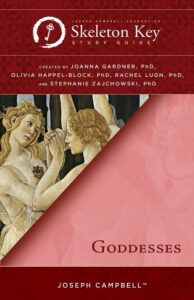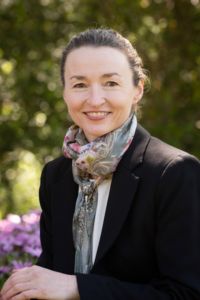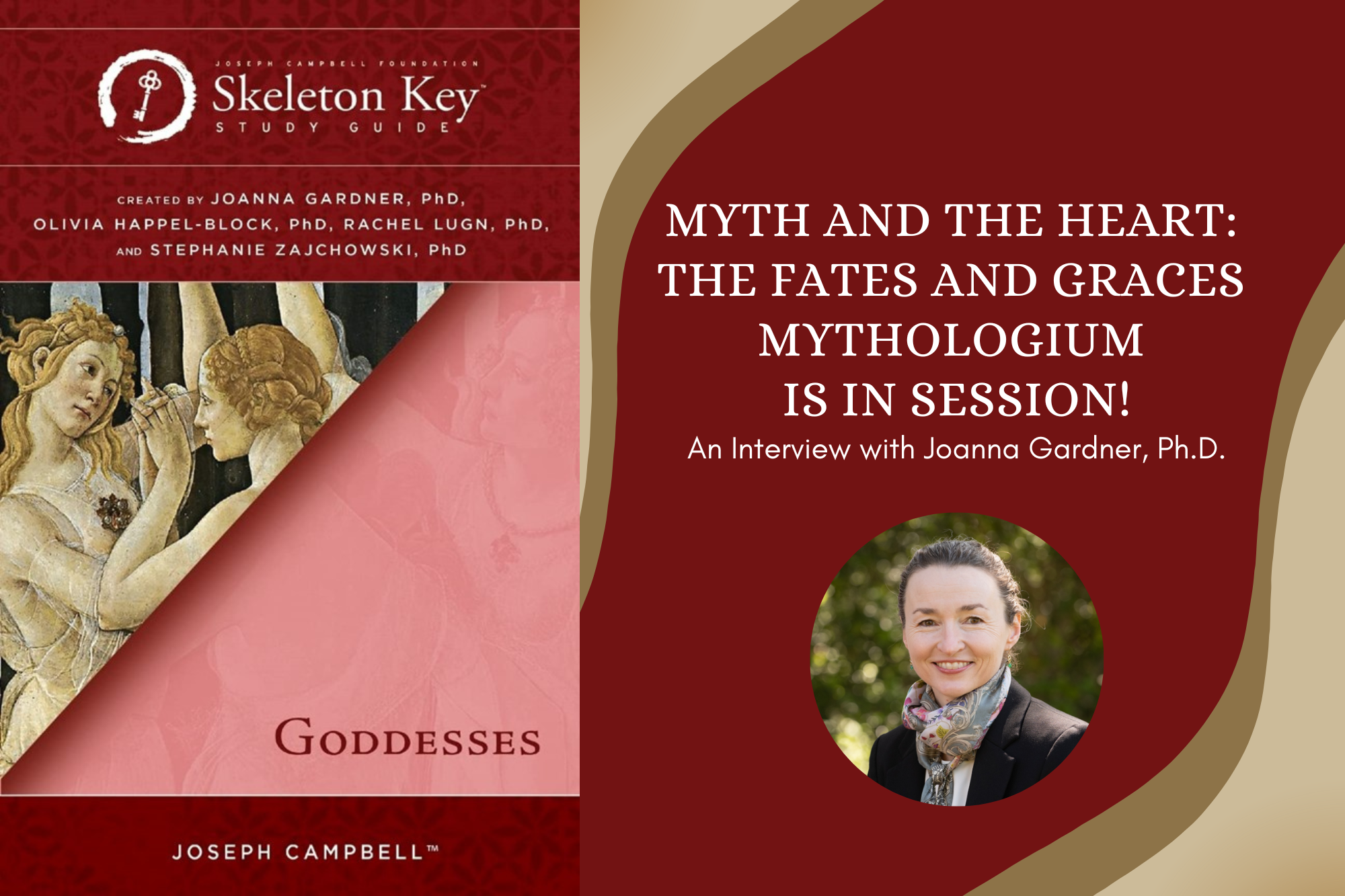 An Interview with Joanna Gardner, Ph.d.
An Interview with Joanna Gardner, Ph.d.
Joanna Gardner is an alumni of and adjunct professor at Pacifica Graduate Institute, in the Mythological Studies specialization. She is also the co-founder of the Fates and Graces Mythologium, which will be held July 28-30, 2023, in Carpinteria, CA
Angela: You are the lead author on Goddesses: A Skeleton Key Study Guide for the Joseph Campbell Foundation’s series of study guides for books by Joseph Campbell. I don’t hear Campbell’s name as often as I hear Jung’s or Hillman’s names at Pacifica, but for a while, specifically in the 80s, Campbell was everywhere in popular culture. How do you conceptualize Campbell’s work within psychology?
Joanna: Campbell was not a depth psychologist, and Pacifica focuses on that area. But Campbell was integral to the founding of the myth program and the whole idea of mythological studies. During his decades of teaching, reading, and writing about myth, he created an oeuvre that still inspires people today. I do believe it’s important to read him with discernment, the same way I read any scholar or writer: trying to stay aware of the time period they were writing in and their personal positionality, and to keep my mind and heart open for the spirit of what they’re saying. It’s the same way I read myths.
Campbell is famous for his book The Hero with a Thousand Faces, published in 1949, which inspired many people in many fields. Over the years, other writers have brought their points of view to bear on that work. There’s Clyde Ford’s The Hero with an African Face: Mythic Wisdom of Traditional Africa, and Jody Bower’s Jane Eyre’s Sisters: How Women Live and Write the Heroine’s Story, among many others. Ford and Bower are carrying Campbell’s work forward, and that’s exactly what I hope the Foundation’s new study guides help more people do.
Angela: Aside from your nonfiction and scholarly work, you are also a poet and a writer of short stories. How does your work with myth intersect with your own creative art?
Joanna: I think of myself as a mythological writer. My background in creative writing is part of the reason I did my dissertation on creation myth and the creative process. In doing that work, I learned to imagine into myths the same way I imagine into a story or poem to write it. And inevitably I use the techniques of fiction when I write about myth. Both those worlds are inextricably intertwined for me, and I wouldn’t have it any other way.
Angela: Perhaps most notable of your endeavors is being the co-founder of the Fates and Graces Mythologium, “a yearly conferences for mythologists and friends of myth.” What inspired this conference and what kind of panels or activities are part of it?
Joanna: We wanted to continue the conversation around myth. I was finishing my dissertation, and so was my friend and Mythologium partner, Stephanie Zajchowski. I was thinking, I need to keep having these conversations. And I felt like there was room in the field of mythology to create a gathering that focused on myth and the community of mythologists. Then, as the idea developed, we started wanting to create the conference in a mythological way. In retrospect, we were re-imagining the archetype of the academic conference, to bring depth to the experience. So, for example, instead of Q&A sessions at the end of panels, we have “Yes-And” discussions, in the tradition of improv theater, where you have to say yes to what came before, to carry the action forward. We say, “Yes, that idea exists, and so does this other idea, and look, so does its opposite!” Then we trust the community to choose the ideas that are most beautiful and useful for them to take away and build on. Our vision is to share ideas, inspire each other, and amplify each other’s work.
We also have a poet-of-the-year for each event. Rumi, Rainer Maria Rilke, Langston Hughes, and Linda Gregg have all joined the Mythologium through their poetry. Every day at some point during the program, we read a poem by that year’s poet, then we have a writing reflection. That way we can absorb the ideas we’re hearing, instead of just racing off to the next panel. And we try to foster conversation, even on Zoom. We want people to connect. It’s really a special container for the community to have a shared experience.
Angela: This is the 5th anniversary of the conference, this year with the theme “Myth and the Heart,” and will be held July 28-30th. What inspired the theme of myth and heart? It occurs to me that although depth psychology fields the human psyche well, I don’t often hear the heart invoked in research.
Joanna: In 2021, the theme was myth and healing, and in 2022 it was myth and ecological consciousness. This year, Stephanie and I had the sense that maybe it’s time to think about thriving, and revivifying, and taking up residence in heart space, where the love of life happens, the love of work, the love of community—re-centering in that felt sense of deep affection.
We’re going to be on the Pacifica campus at Lambert. The main center of the conference will be in South Hall, where we’ll stream on Zoom. Presenters are pre-recording 20-minute videos, which will go into a video library that we’re calling MythFlix, then live panels at the Mythologium will have a 5-minute overview of each presentation and 20 minutes for the Yes-And discussion. We want the focus to be on connection and celebration. We’ll have long lunches, a photographer to take headshots for people, and marketing office hours for anyone who wants to brainstorm their own marketing efforts. The Campbell Foundation and Pacifica Graduate Institute Alumni Association will be there, and we’ll have other surprises as well.
You should join us! The Mythologium is all about cultivating the community of mythologists. If you’re interested in myth, you belong there.
Angela: You continue to participate in the scholarly discourse at Pacifica as an adjunct professor in the Mythological Studies Program. What courses do you teach and what do you most value or enjoy about teaching students at Pacifica? Did you obtain your degree in the same program, and if so, what was that experience like for you?
Joanna: I completed my Ph.D. in the myth program in 2019, and it was transformative. I remember people asking me what I was going to do with a myth degree. I didn’t have an answer at the time, but I had an intuitive sense that this was the work I needed to do. The myth program gave me the chance to learn what I needed in order to do what came next in my life, which is everything I’m doing now. The thing I love most about the program is how it holds space for both academic and creative work.
I’m currently teaching research strategies and dissertation formulation at Pacifica. Both classes are for third-year students before they embark on their dissertations. It combines my research into the creative process with my mythological writing. In research strategies, we talk about how to undertake this big project and get it done, how to work with theories and theorists. Then in dissertation formulation, we workshop the concept papers that will ultimately become the first chapter of all these amazing new dissertations. There’s this sense that the students’ projects are full of possibility, and the students will have an amazing adventure bringing the projects into the world, and that adventure will set them up for whatever comes next. Pacifica is a unique environment in part because everyone is passionate about being there. Nobody’s parents made them enroll. That makes the work a joy.
Angela: Do you have any upcoming publications or research projects to share with us? What is next for you?
Joanna: I have a MythBlast essay coming out with the Campbell foundation in July. You can subscribe to receive MythBlast emails at jcf.org/subscribe. I’m also the series editor of the Campbell Foundation’s study guides, and there are more of those books forthcoming over the summer. And Stephanie and I will be leading a live, 1-day workshop the day before the Mythologium called Your Soul’s Resume: Reconnecting with Your Calling and Purpose.
Angela: Thank you so much for speaking with me, and best of luck with all of your work.
Joanna: Thank you, Angela!
For enroll in the Fates and Graces Mythologium, July 28-30, 2023, visit here.

Angela Borda is a writer for Pacifica Graduate Institute, as well as the editor of the Santa Barbara Literary Journal. Her work has been published in Food & Home, Peregrine, Hurricanes & Swan Songs, Delirium Corridor, Still Arts Quarterly, Danse Macabre, and is forthcoming in The Tertiary Lodger and Running Wild Anthology of Stories, Vol. 5.

Joanna Gardner, PhD is a writer, mythologist, and magical realist. Joanna co-founded and co-leads the Fates and Graces Mythologium, a conference for mythologists and friends of myth. She serves as the director of marketing and communications at the Joseph Campbell Foundation, and as an adjunct professor in Pacifica Graduate Institute’s mythological studies program. Joanna’s work appears in a variety of venues. You can learn more and reach her at joannagardner.com.


